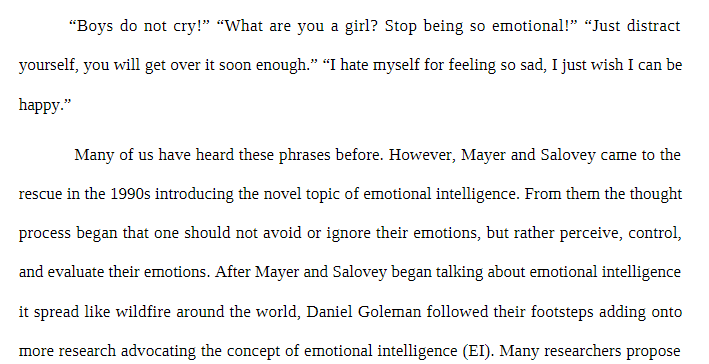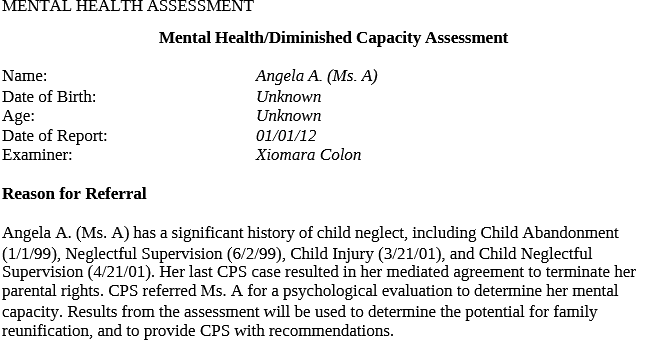PSY 510 PSY510 Milestone Three.docx- Snhu
$4.99$16.99
PSY 510 PSY510 Milestone Three.docx- Snhu
“Boys do not cry!” “What are you a girl? Stop being so emotional!” “Just distract yourself, you will get over it soon enough.” “I hate myself for feeling so sad, I just wish I can behave.”Many of us have heard these phrases before. However, Mayer and Salovey came to the rescue in the 1990s introducing the novel topic of emotional intelligence. From them, the thought process began that one should not avoid or ignore their emotions, but rather perceive, control, and evaluate their emotions. After Mayer and Salovey began talking about emotional intelligence spread like wildfire around the world, Daniel Goleman followed in their footsteps adding to more research advocating the concept of emotional intelligence (EI). Many researchers propose emotional intelligence is learned and strengthened whereas others believe it is inbuilt.
Description
PSY 510 PSY510 Milestone Three.docx- Snhu
“Boys do not cry!” “What are you a girl? Stop being so emotional!” “Just distract yourself, you will get over it soon enough.” “I hate myself for feeling so sad, I just wish I can behave.”Many of us have heard these phrases before. However, Mayer and Salovey came to the rescue in the 1990s introducing the novel topic of emotional intelligence. From them, the thought process began that one should not avoid or ignore their emotions, but rather perceive, control, and evaluate their emotions. After Mayer and Salovey began talking about emotional intelligence spread like wildfire around the world, Daniel Goleman followed in their footsteps adding to more research advocating the concept of emotional intelligence (EI).
PSY 510 PSY510 Milestone Three.docx- Snhu
Many researchers propose emotional intelligence is learned and strengthened whereas others believe it is inbuilt. Perhaps it is a combination of both, an innate and learned skill. From childhood, many of us are taught to simply ignore our emotions, especially negative ones, but emotional intelligence has taught us to use emotions in a healthy way and enhance our thoughts. EI has been defined by many researchers as being able to observe your own as well as other people’s feelings and emotions, being able to differentiate them, and using the information obtained from the emotions to assist one’s own thoughts and actions. Through this a person can regulate emotions for both emotional and intellectual growth, emotional intelligence is not hearted over mind, but it is the unique combination of both.
PSY 510 PSY510 Milestone Three.docx- Snhu
Mastering EI allows one to be successful in many areas of life including; leadership, partnerships, networking, cooperation, teamwork, influencing and developing others, and overall a successful and healthier lifestyle.“If you believe in yourself, you can accomplish anything you want.” Many people have seen or heard this at some point in their lives. Perhaps we will not always accomplish anything we want, we make mistakes and face disappointments in life. But one thing is for sure, believing in yourself and accepting yourself for who you are despite those tiny flaws is an important factor in a successful life in every aspect. This is where self-esteem (SE) plays a role. SE is how we judge ourselves, feel about ourselves, and a depiction of our self-worth. It is believing in ourselves and our abilities in a positive and healthy way. A person’s beliefs about all qualities, traits, and individualities within himself is another way to define self-esteem.
PSY 510 PSY510 Milestone Three.docx- Snhu
- PSY 211 – Lifespan Development (5015 Documents),
- PSY 215 – Abnormal Psychology (4335 Documents),
- PSY 108 – Introduction to Psychology (3759 Documents),
- PSY 223 – Statistics for Psychology Research (2652 Documents),
- PSY 216 – Psychology of Personality (1841 Documents),
- PSY 510 – Research Methods (1748 Documents),
- PSY 520 – Research Methods in Psychology II (1469 Documents),
- PSY 257 – Psychology (1451 Documents),
- PSY 310 – Criminal Psychology (1393 Documents),
- PSY 200 – FOUNDATIONS OF ADDICTIONS (1379 Documents),
Only logged in customers who have purchased this product may leave a review.







Reviews
There are no reviews yet.